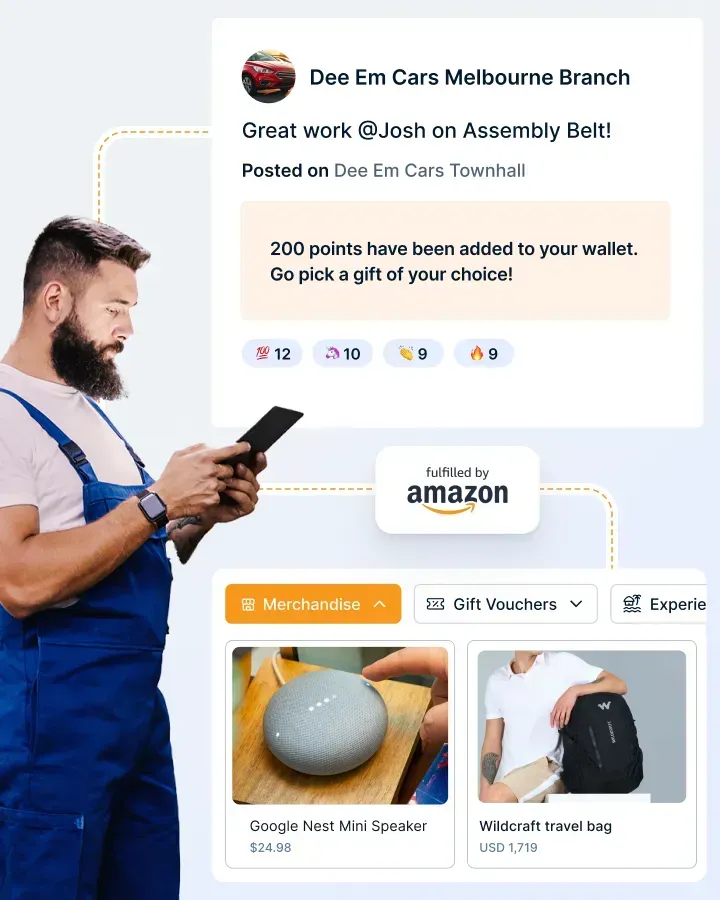14 Employee Engagement Activities for Blue Collar Workers to Motivate and Empower Them
Discover 14 proven employee engagement activities for blue-collar workers that boost morale and productivity. Explore real-world examples to create a motivated and committed workforce.
On this page
Keeping blue-collar employees engaged requires more than just competitive wages. A positive work environment, recognition, and growth opportunities play a major role in job satisfaction and productivity. Unlike office employees, frontline workers benefit from blue-collar activities that fit their daily routines and work settings.
A well-planned blue-collar employee engagement strategy strengthens team morale, reduces turnover, and increases efficiency. Simple yet effective initiatives like skills training, wellness programs, and peer recognition help employees feel valued and motivated. When engagement efforts align with their needs, workers develop a stronger connection to their roles and the company.
This blog explores employee engagement activities for blue-collar workers that create a lasting impact. Whether managing teams in manufacturing, logistics, or construction, these strategies will help build a more committed and productive workforce.
Who are blue-collar employees and why are they important?
Blue-collar workers perform manual labor, categorized into unskilled, semi-skilled, or skilled labor based on the nature of their operation.
India has long been identified as a nation with cheap labor, and MNCs have enjoyed this cost arbitrage, but this scenario is gradually changing.
90% of industries have stated acute labor shortage and observed that with access to education systems government schemes like MNERGA, it is becoming increasingly difficult to mobilize resources to join initiatives at the worker level, thus impacting production and revenues.
Besides these external factors, some internal ones aggravate the engagement issue for blue-collar employees. Factors like high wage disparity, very controlled or hazardous working conditions, monotonous and physically exhausting work with no focus on up-gradation or growth lead to low job satisfaction and high disengagement.
Disengagement of this layer is far more damaging. It is visible by the circumstantial evidence in the past where organizations like Honda, Nokia, Maruti had to face the adverse effects of labor unrest. But there are enough examples where organizations have gone ahead in defining engagement differently and reaped enormous benefits.
Thus companies need to change how they treat blue-collar workers and look for newer avenues or reform the old ones to drive meaningful engagement.
Challenges faced by blue-collar workers and how employee engagement can fix it
Blue-collar workers play a crucial role in various industries, and their job roles often come with specific challenges. Employee engagement can help address many of these challenges by creating a more supportive and motivating work environment. Here are five common challenges faced by blue-collar workers and how employee engagement can help:
1. Physical demands and fatigue
- Challenge: Blue-collar jobs often require strenuous physical labor, leading to fatigue and potential health issues.
- How employee engagement helps: Engaged workers are more likely to take pride in their work, leading to better self-care and adherence to safety guidelines. Engaged employees are also more likely to communicate when they need assistance or accommodations, reducing the risk of injury.
2. Lack of career development opportunities
- Challenge: Blue-collar workers may perceive limited opportunities for career advancement, which can lead to stagnation and frustration.
- How employee engagement helps: Engaging blue-collar workers involves offering training programs and clear paths for advancement. When employees see a future within the organization, they are more likely to stay committed and motivated.
3. Limited access to technology
- Challenge: Many blue-collar workers have limited access to technology and communication tools, making it challenging to stay connected and informed.
- How employee engagement helps: Implementing accessible communication channels, like regular team meetings or mobile apps, can help bridge this gap. Engaging workers through technology also enables better access to training and important updates.
4. Lack of recognition
- Challenge: Blue-collar workers' contributions are often less visible than those of their white-collar counterparts, leading to feelings of underappreciation.
- How employee engagement helps: Recognizing and appreciating the hard work of blue-collar employees is crucial. Employee engagement programs can include recognition initiatives, such as "Employee of the Month" awards, shout-outs during meetings, or even small bonuses. These gestures boost morale and motivation.
5. High turnover rates
- Challenge: Many blue-collar jobs have high turnover rates due to the demanding nature of the work, leading to recruitment and training costs.
- How employee engagement helps: Engaged employees are less likely to leave their jobs. By investing in their well-being, offering opportunities for skill development, and creating a positive work culture, turnover rates can be significantly reduced, saving the organization time and resources.
Keep your deskless blue-collar, frontline, and service workers engaged, motivated and aligned at all times with an accessible mobile-first blue-collar employee engagement platform.
10 Employee engagement activities for blue collar workers
Employee engagement activities for blue collar workers play a crucial role in boosting morale, productivity, and retention in industries that heavily rely on physical labor. Here are 14 effective employee engagement ideas for blue collar workers with real-world examples of companies that have successfully implemented them:
1. Safety recognition programs
Safety recognition programs are designed to reward and acknowledge blue collar workers who consistently prioritize safety in the workplace. These programs promote a culture of safety awareness and encourage employees to actively participate in creating a safer working environment.
They introduced the "Safety First, Second, and Third" initiative, which focuses on recognizing and rewarding employees for their safety contributions.
Balfour Beatty implemented a peer-to-peer recognition system, allowing workers to nominate their colleagues for demonstrating exceptional safety practices.
As part of the program, employees who receive nominations are awarded safety-themed prizes or cash incentives. This approach not only incentivizes safer work practices but also fosters a sense of community and shared responsibility among workers.
Balfour Beatty's commitment to safety through recognition has resulted in significantly reduced accident rates and a safer work environment for their blue collar workforce.
2. Employee-led training and skill development
Empowering blue collar workers to take ownership of their own skill development and knowledge sharing is a highly engaging activity. Companies can encourage employees to lead training sessions or workshops in areas where they excel, creating opportunities for peer-to-peer learning.
For instance, a veteran welder might lead a workshop on advanced welding techniques, while an experienced heavy equipment operator might share tips on efficient machine operation. These sessions are not only informative but also promote collaboration and knowledge sharing among workers.
Caterpillar believes that when employees have the opportunity to share their knowledge, they feel more valued and engaged in their roles.Furthermore, Caterpillar recognizes and rewards employees who actively participate in these training programs.
This could include certificates of achievement, small monetary incentives, or opportunities for career advancement. The result is a more skilled and engaged blue collar workforce that contributes to the company's success.
3. Workplace improvement challenges
Workplace improvement challenges involve inviting blue collar workers to propose and implement innovative ideas to enhance workplace efficiency, safety, or sustainability. These challenges empower employees to take ownership of their work environment and contribute positively to their roles.
Toyota, a renowned automobile manufacturer, has a longstanding practice called the "Kaizen" system, which encourages continuous improvement. In their manufacturing facilities, employees are not only responsible for their daily tasks but also encouraged to suggest and implement improvements in their workstations.
This practice has not only led to a more engaged workforce but also a culture of ongoing improvement that contributes to Toyota's renowned quality and productivity.
4. Peer mentorship programs
Peer mentorship programs pair experienced blue collar workers with newcomers or less-experienced employees. These mentorship relationships facilitate knowledge transfer, skill development, and the establishment of strong working relationships.
The mentorship program has proven to be instrumental in helping new employees adapt to their roles and integrate into the company culture.
It not only enhances the skills and confidence of the mentees but also fosters a sense of camaraderie and belonging within the workforce. Cargill recognizes the mentors' contributions through incentives and recognition programs.
5. Employee-driven community service projects
Engaging blue collar workers in community service projects not only benefits local communities but also strengthens team bonds and instills a sense of pride and purpose among employees. These projects involve employees volunteering their time and skills for the betterment of the community.
By participating in these projects, Home Depot's employees feel a strong sense of fulfillment and community involvement. The company supports and recognizes their efforts, often featuring these initiatives in their corporate communications and rewarding employees with volunteer grants or incentives.
6. Employee appreciation days with personalized gifts
Employee appreciation days are dedicated to recognizing and showing gratitude to blue collar workers for their hard work and dedication. To make it more engaging, companies can personalize gifts based on each employee's interests or achievements.
For instance, a worker who enjoys gardening might receive gardening tools or seeds as a gift. This personal touch demonstrates that the company values and appreciates its blue collar workforce on an individual level.
7. Skills competitions and trade show participation
Sharing expertise among peers ensures that a broader skill set is available within the workforce. Maria Rose, owner of Nation Waste acknowledges that, “It all goes back to the lessons I learned on our farm about running a small business and paying it forward. If you practice what you preach and give back to your community, you will be enriched and rewarded.”
You can also share your thoughts and insights in the form of newsletters and send them out weekly or monthly to your employees. Use an email newsletter software to create appealing and attractive newsletters effortlessly.
The winners receive recognition, prizes, and sometimes even opportunities for further training or career advancement. Additionally, John Deere encourages its employees to participate in trade shows and exhibitions, where they can interact with customers and industry professionals, further enhancing their skills and engagement.
8. Flexible work arrangements and rotations
Offering flexible work arrangements or rotational job opportunities can provide blue collar workers with a sense of variety and control over their work lives. This can help combat monotony and increase job satisfaction.
For example, a production line worker might have the opportunity to work in research and development for a period. This approach not only keeps the work engaging but also provides valuable career growth opportunities.
Michelin's commitment to employee development through flexible work arrangements has contributed to a highly engaged blue collar workforce.
9. Employee ownership programs
Employee ownership programs involve offering eligible blue collar workers the opportunity to become partial owners of the company through stock ownership or profit-sharing plans. This not only financially rewards employees but also creates a sense of ownership and commitment to the company's success.
Over time, these shares can accumulate and provide employees with a significant stake in the business. This ownership model has led to a strong sense of commitment and engagement among WinCo Foods' blue collar workforce, as they directly benefit from the company's profitability and success.
10. Continuous improvement teams
Continuous improvement teams involve blue collar workers forming groups to identify and implement process improvements within their work areas. These teams are given the autonomy to propose and execute changes that can enhance efficiency, safety, or product quality.
For instance, a team may suggest a more ergonomic way to assemble motorcycle components or a more efficient inventory management system. Harley-Davidson's commitment to empowering its blue collar workers to drive improvements has not only resulted in increased employee engagement but also improved product quality and cost savings.
11. Flexible shift scheduling and remote work options
Providing flexible shift scheduling or remote work options can improve work-life balance for blue collar workers. While not applicable to all industries, some companies have successfully implemented these options, especially in roles where it's feasible.
Additionally, in certain administrative and support roles, FedEx Ground has implemented remote work options, allowing employees to work from home part-time. These flexible arrangements help employees better manage their work and personal lives, leading to higher job satisfaction and engagement.
12. Peer recognition programs
Peer recognition programs allow blue collar workers to recognize and appreciate their colleagues' contributions. Employees nominate their peers for outstanding performance or acts of kindness, and the recognized individuals receive rewards or recognition.
Nominated employees receive Bravo points, which can be redeemed for a variety of rewards, including gift cards, merchandise, or extra paid time off. This program not only encourages a culture of appreciation but also boosts morale and engagement among blue collar workers.
13. Employee engagement surveys and feedback loops
Regularly conducting employee engagement surveys and creating feedback loops is essential to understand blue collar workers' needs and concerns. These surveys provide a platform for employees to voice their opinions and suggest improvements.
For instance, if safety issues are raised, they take immediate steps to enhance safety measures. This commitment to feedback and action demonstrates that employees' opinions are valued and that the company is invested in their well-being and job satisfaction.
14. Wellness challenges and incentive programs
Wellness challenges and incentive programs promote healthy habits among blue collar workers. These activities can include step challenges, weight loss competitions, or stress reduction initiatives, with rewards for achieving health and wellness goals.
Participants can earn rewards such as fitness equipment, wellness-related gift cards, or even contributions to their health savings accounts for meeting specific milestones. This initiative not only promotes a healthier workforce but also enhances employee engagement by demonstrating the company's commitment to employee wellness.
How can Empuls help in engaging blue collar employees?
Empuls is an employee engagement and recognition platform that can be valuable for engaging blue-collar employees. Blue-collar workers often have unique needs and challenges compared to their white-collar counterparts, and Empuls can help address these specific requirements.

Here are ways Empuls can assist in engaging blue-collar employees:
- Communication and feedback: Empuls provides a platform for two-way communication between management and blue-collar employees. It allows for regular updates, announcements, and feedback collection, ensuring that these employees feel heard and involved in company matters.
- Recognition and rewards: Blue-collar workers often appreciate immediate recognition for their efforts. Empuls allows managers and colleagues to send recognition, appreciation, and rewards to employees, boosting their motivation and job satisfaction.
- Peer-to-peer recognition: Empuls encourages peer-to-peer recognition, allowing blue-collar employees to acknowledge and appreciate each other's contributions. This helps create a positive work environment and fosters camaraderie among team members.
- Surveys and feedback: Empuls enables the creation and distribution of surveys to gather feedback from blue-collar workers about their work environment, safety concerns, and job satisfaction. This data can help management address specific issues and make improvements.
- Wellness programs: Empuls can support wellness initiatives and programs aimed at improving the physical and mental well-being of blue-collar employees. This can include fitness challenges, mental health resources, and access to wellness incentives.
- Mobile accessibility: Blue-collar workers may not always have access to desktop computers, so Empuls's mobile app ensures that they can stay connected and engaged through their smartphones.
- People analytics: Empuls provides data analytics and insights that can help HR and management identify trends and areas for improvement in blue-collar engagement. This data-driven approach can lead to more targeted and effective engagement strategies.
Empuls can be a valuable tool for engaging blue-collar employees by providing a platform for communication, recognition, skill development, and wellness initiatives. It helps create a positive work culture and fosters a sense of belonging among blue-collar workers, ultimately leading to improved job satisfaction and retention.
Conclusion
Engaging blue collar workers is a multifaceted endeavor that requires creativity and a genuine commitment to their well-being and job satisfaction.
With these engagement activities tailored to their needs and preferences, businesses can create a positive and productive work environment where blue collar employees feel valued and motivated to excel. Investing in the engagement of these essential workers is an investment in the success of the entire organization.













